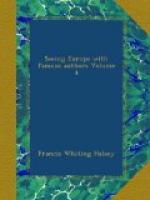Napoleon said that it [Holland] was an alluvion of Trench rivers—the Rhine, the Scheldt, and the Meuse—and with this pretext he added it to the empire. One writer has defined it as a sort of transition between land and sea. Another, as an immense crust of earth floating on water. Others, an annex of the old continent, the China of Europe, the end of the earth, and the beginning of the ocean, a measureless raft of mud and sand; and Philip II. called it the country nearest to hell.
But they all agreed upon one point, and all exprest it in the same words:—Holland is a conquest made by man over the sea—it is an artificial country—the Hollanders made it—it exists because the Hollanders preserve it—it will vanish whenever the Hollanders shall abandon it.
To comprehend this truth, we must imagine Holland as it was when first inhabited by the first German tribes that wandered away in search of a country. It was almost uninhabitable. There were vast tempestuous lakes, like seas, touching one another; morass beside morass; one tract covered with brushwood after another; immense forests of pines, oaks, and alders, traversed by herds of wild horses; and so thick were these forests that tradition says one could travel leagues passing from tree to tree without ever putting foot to the ground. The deep bays and gulfs carried into the heart of the country the fury of the northern tempests. Some provinces disappeared once every year under the waters of the sea, and were nothing but muddy tracts, neither land nor water, where it was impossible either to walk or to sail. The large rivers, without sufficient inclination to descend to the sea, wandered here and there uncertain of their day, and slept in monstrous pools and ponds among the sands of the coasts. It was a sinister place, swept by furious winds, beaten by obstinate rains, veiled in a perpetual fog, where nothing was heard but the roar of the sea, and the voice of wild beasts and birds of the ocean.
Now, if we remember that such a region has become one of the most fertile, wealthiest and best regulated of the countries of the world, we shall understand the justice of the saying that Holland is a conquest made by man. But, it must be added, the conquest goes on forever.
To drain the lakes of the country the Hollanders prest the air into their service. The lakes, the marshes, were surrounded by dikes, the dikes by canals; and an army of windmills, putting in motion force-pumps, turned the water into the canals, which carried it off to the rivers and the sea. Thus vast tracts of land buried under the water, saw the sun, and were transformed, as if by magic, into fertile fields, covered with villages, and intersected by canals and roads. In the seventeenth century, in less than forty years, twenty-six lakes were drained. At the beginning of the present century, in North Holland alone, more than six thousand hectares, or fifteen thousand acres, were thus redeemed from the waters;




